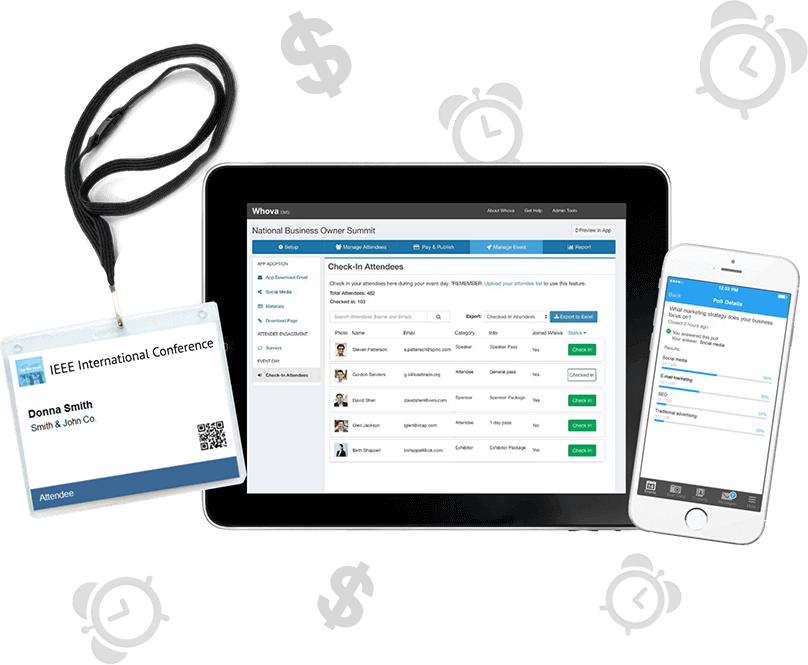Event marketing tools can transform your event from an empty venue into a vibrant, packed space humming with meaningful interactions. With the importance of event marketing tools comes the equal importance of choosing an event marketing platform that can support all the event marketing tools you want to include in your event. Like 85% of event organizers, you may want to opt for an event marketing software platform or a mobile event marketing app. These event software platforms can extend the audience reach of your event marketing through event promotions, generating more excitement for your event and increasing attendance.
With so many great event marketing platforms out there, you have to decide: Do you choose to use multiple specialized marketing platforms to build your martech stack or go with an all-in-one solution? From email campaign software and social media promotion tools to all-in-one event management platforms, this blog provides insight into the best event marketing software to help you find the most suitable solution for your event marketing needs.
Best All-in-One Event Marketing Solutions
Full-scale event marketing platforms integrate attendee registration, email marketing, social media promotion, analytics, and engagement strategies into a cohesive system that streamlines your entire event workflow.
1. Whova
Whova’s all-in-one platform manages every aspect of your event marketing plan, from promotion to attendee engagement and more.
Whova is a comprehensive event management platform for in-person, hybrid, and virtual events. Our software’s effectiveness and reliability have earned the trust of industry giants like Deloitte, IKEA, NASA, the American Marketing Association, and others, propelling us into G2’s top 50 apps.
Such widespread adoption by leading organizations underscores Whova’s capacity to meet the complex demands of high-stakes events across various sectors. Meticulously designed with event managers, exhibitors, and attendees in mind, our event management and marketing tools streamline logistics, saving you up to 60% of your time.
From a marketing perspective, Whova’s mobile app drives engagement and buzz through timely push notifications, targeted emails, and seamless social media integration before, during, and after your event. Moreover, it saves over 60% in printing costs and drives 10x engagement with minimal effort.
Moreover, Whova’s Event Webpage Builder lets you create polished event pages to market your event without coding or design expertise. Choose from our many attractive templates designed to grab attention and drive registrations. Plus, you can seamlessly embed these pages into your website to maintain your brand’s look and feel. The event webpage will update in real time as you update your event details from the backend.
Also noteworthy is our web traffic analytics and social media tools to create eye-catching posts and schedule them across multiple social media channels. Our comprehensive approach to event marketing streamlines complex tasks, enhances attendee engagement, and provides valuable insights for your event’s success.
Notable Features: Email campaigns, social media integration, event landing pages (event website, speaker website), attendee engagement features (live polls, Q&A), and integrations with other platforms such as MailChimp, Constant Contact, WildApricot, and Zapier.
Why Choose: Whova stands out for its user-friendly interface and all-in-one event management and marketing features. By integrating with other tools and planning features mentioned above, Whova consolidates your event management needs into a single platform, eliminating the juggling act of multiple apps and enhancing overall efficiency.
Price: Pricing information can be given at our free demos.
2. Bizzabo
Bizzabo’s comprehensive event marketing platform offers event registration, email marketing, wearable tech, and detailed analytics.
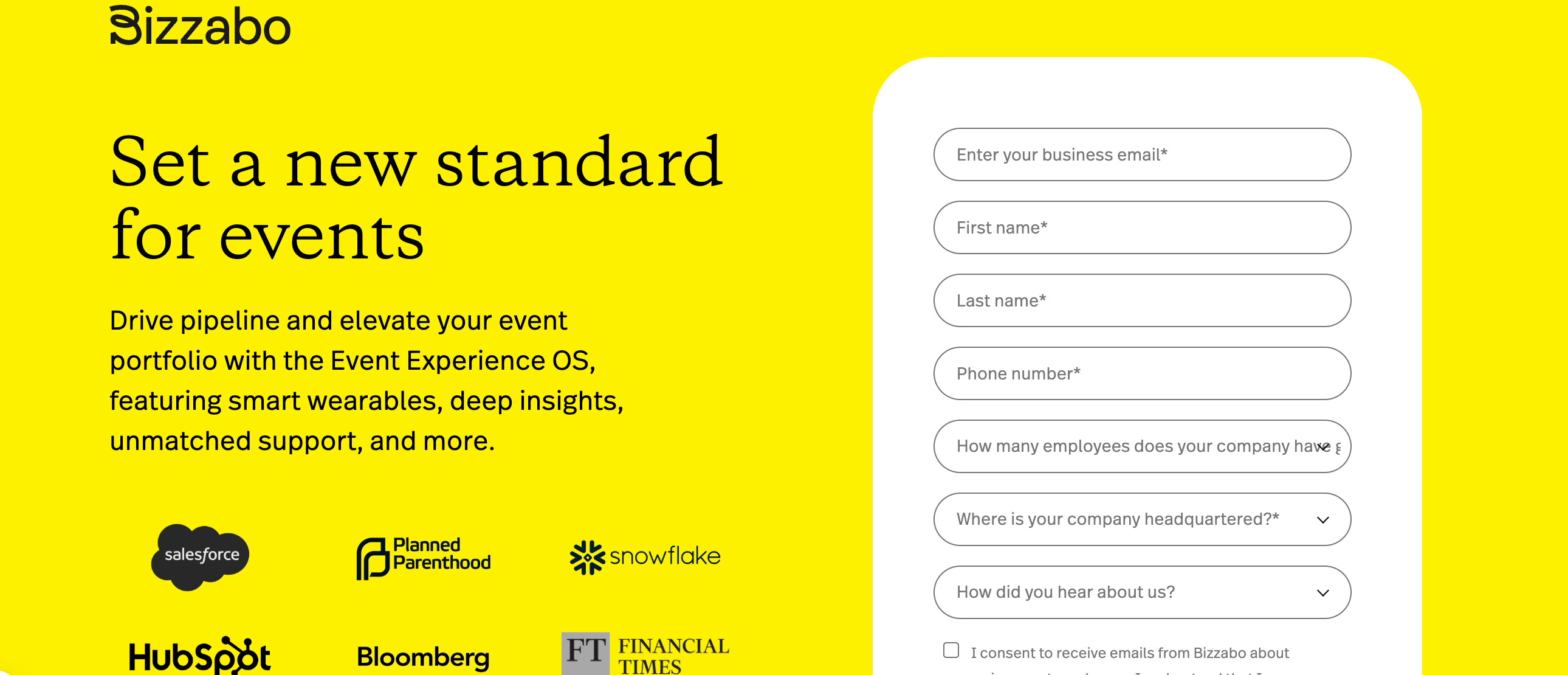
image credit to Bizzabo
Like Whova, Bizaboo has earned the trust of reputable organizations for B2B virtual, hybrid, and in-person events, including Amazon, the Harvard Business Review, and the Wall Street Journal. Its compatibility with popular martech tools—think Marketo, HubSpot, Eloqua, Pardot, and Salesforce—simplifies ticketing, registration, and analytics.
Bizzaboo also enhances event registrations through personalized registration flows, advanced promo codes, and UTM tracking. Its intelligent attendee segmentation boosts email engagement, while built-in social sharing features transform event attendees into enthusiastic advocates.
Easy integration with your CRM (customer relationship management), enables personalized, omnichannel communication throughout your event’s lifecycle. You can even measure event campaign effectiveness with Google Analytics and Google Tag Manager and then analyze the results through pre-built reporting templates or custom reports tailored to your specific success metrics.
Modern event planning can be complex, which is why Bizzabo offers a blend of synchronous and asynchronous training to get event planners up to speed with its software. This makes it relatively easy to learn the essentials, like event setup, registration flows, email campaigns and analytics.
How does Bizzabo measure up to Whova? Not quite as well, according to user reviews. Looking at G2 ratings, Whova boasts a perfect 5-star rating across 1,522 reviews, while Bizzabo trails with 4.5 stars from 348 reviews. This significant difference in both rating and review count suggests that Whova not only satisfies more users but also consistently delivers a superior experience that resonates with its larger customer base.
Notable Features: Email marketing, social media integrations, event website creation, integration with Google Tag Manager and Analytics, and interactive Klik SmartBadge™ for lead capture and real-time attendee monitoring.
Why Choose: Since Bizaboo integrates with a wide range of third-party tools, including CRM systems, payment gateways, and marketing automation platforms, it is best suited for large-scale events needing robust marketing features.
Pricing: Starts at $499/user
Email Marketing Tools for Event Promotion
Want effective email campaigns to promote events, increase registrations, and keep event attendees engaged? Use Mailchimp or HubSpot.
3. Mailchimp
The world’s “#1 email marketing and automation brand” integrates with many popular tools for effective event promotion.
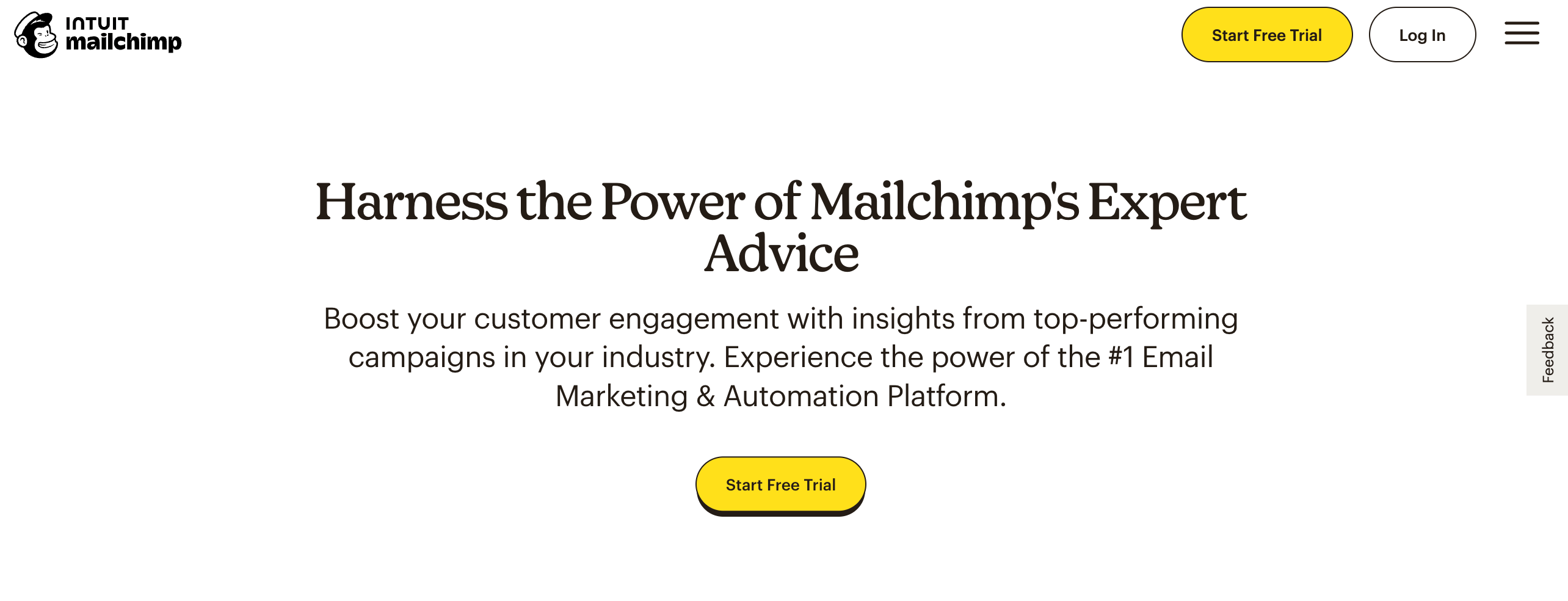
image credit to Mailchimp
Mailchimp is a leading email marketing platform that helps more than 11 million global users create, send, and manage email campaigns. Established 22 years ago, it reportedly delivers up to 25X ROI and generates $1.7K per campaign.
Event marketers appreciate MailChimp’s pre-built templates for creating newsletters, promotional offers, drip campaigns, and abandoned cart reminders. Its automation features also let you set up trigger-based emails, ensuring seamless communication with attendees.
Beyond email, Mailchimp offers robust analytics and reporting tools to review open rates, click-through rates, and campaign revenue. With its scalable pricing model, including a free tier for small businesses, Mailchimp grows alongside your business, adapting to its changing needs. The best part is Whova comes with built-in Mailchimp integration.
Notable Features: Email automation, personalized pre-built templates, audience segmentation, intuitive drag-and-drop editor, and advanced audience segmentation.
Why Choose: Marketers favor Mailchimp’s powerful audience segmentation, allowing for hyper-targeted marketing campaigns based on demographics, behavior, and engagement. Its intuitive interface and rich template library make creating compelling emails effortless, even for beginners.
Pricing: Starts at $15.90/month
4. HubSpot
Another well-known email marketing platform and CRM, HubSpot, offers customizable templates, A/B testing, and automated workflows.
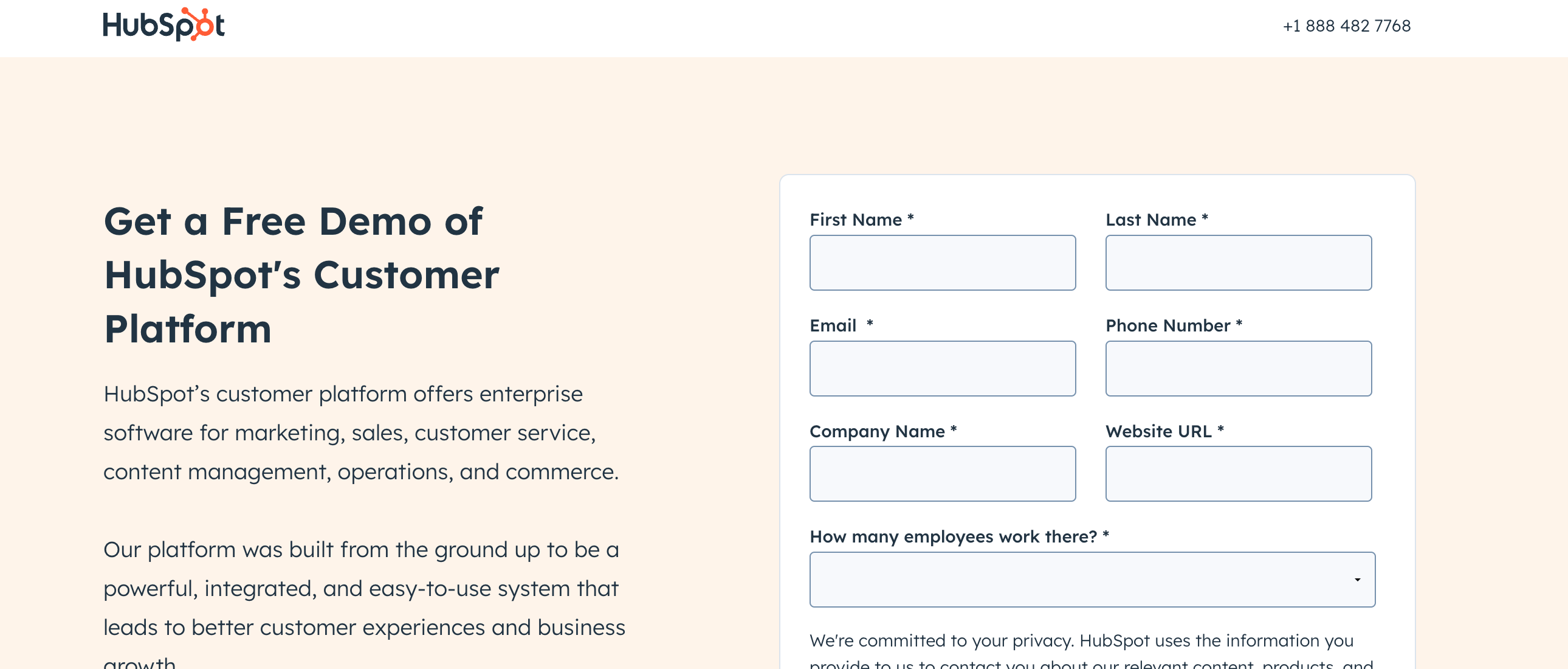
image credit to Hubspot
HubSpot leverages CRM data to tailor content to individual recipients based on their interactions, preferences, and position in the sales funnel. The platform excels in automation, offering advanced features to set up complex workflows triggered by user behavior, time delays, or other conditions.
Its robust analytics suite provides detailed insights into a campaign’s email performance, including open rates, click-through rates, and conversion metrics. This enables event marketers to continually refine their event promotion strategies.
Content creation is simplified with a drag-and-drop email builder and customizable templates, making it accessible without coding skills. As an added bonus, HubSpot’s lead scoring feature automatically evaluates leads based on their interactions with your emails and other content so you can prioritize follow-ups.
Notable Features: Contact management, email personalization, detailed analytics, A/B testing, SEO recommendations, Ad management, and a landing page builder.
Why Choose: Event marketers gravitate towards HubSpot for its advanced personalization engine, which lets them craft laser-focused marketing campaigns that speak directly to distinct audience segments.
Pricing: Starts at $800/month.
Social Media Marketing Tools for Events
Turn likes into ticket sales and hashtags into trends with social media marketing platforms designed to help you better promote your event and increase its online reach.
5. Hootsuite
Hootsuite is a social media management platform that schedules event promotions across multiple channels.
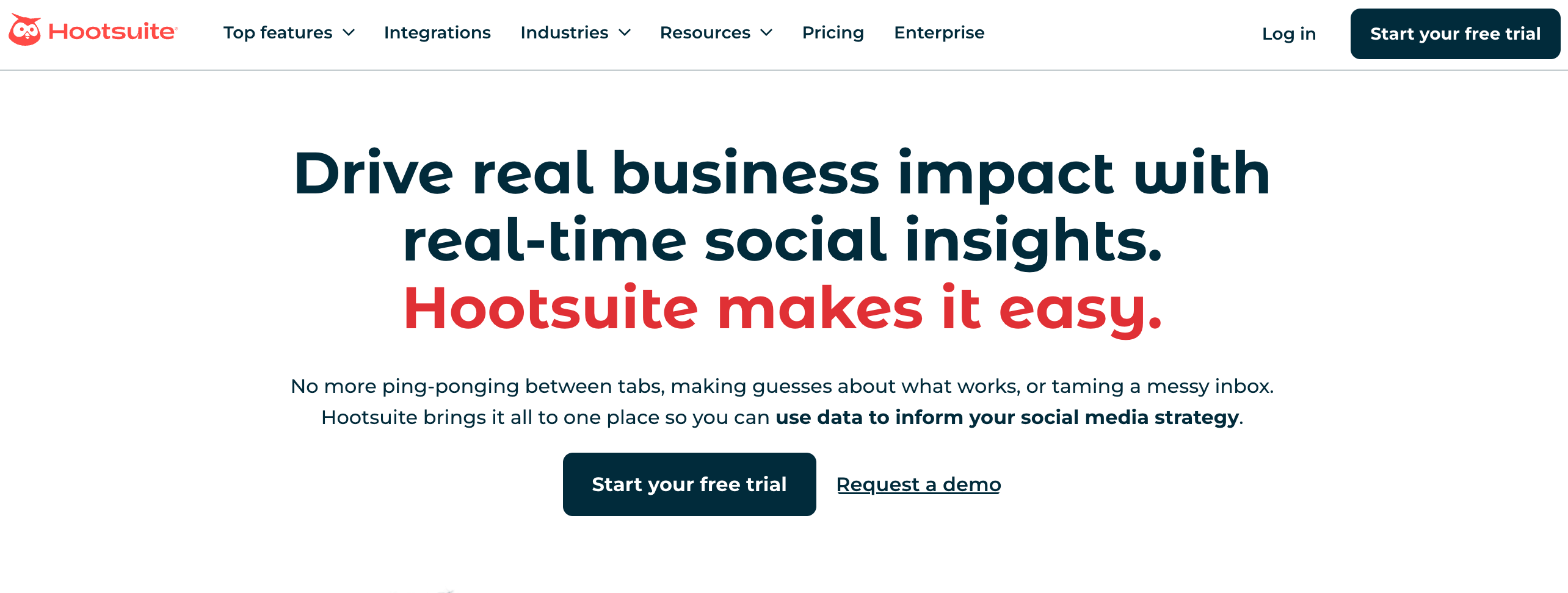
image credit to Hootsuite
Leading social media management platform Hootsuite delivers measurable results for event organizers: a 636% year-over-year surge in social reach, a 500% expansion across all social channels, and a 250% increase in revenue directly attributed to social media efforts.
HootSuite’s centralized dashboard powers customer success by streamlining the process of planning, creating, and publishing content. With its intuitive content calendar, you’ll get a bird’s-eye view of your entire social strategy—from organic posts to paid marketing campaigns—all neatly laid out for planning and team coordination.
It’s easy to stay ahead of the curve with HootSuite’s trend discovery tool, which keeps you in the loop on brand mentions and hot topics. And you can turn these insights into engaging posts with its AI capabilities. What about busy weeks? Bulk scheduling has your back, letting you queue up content in advance.
Notable Features: Scheduling posts for social media, analytics, integration with event platforms like Eventbrite, Ad management and social listening and monitoring,
Why Choose: HootSuite is great for managing multiple social media accounts from a single dashboard, ensuring consistent event promotion across platforms. Its data-driven approach also helps refine promotional tactics and optimize content scheduling.
Pricing: Starts at $99/month
6. Buffer
Buffer is a simple and effective tool for scheduling social media posts and analyzing their performance.
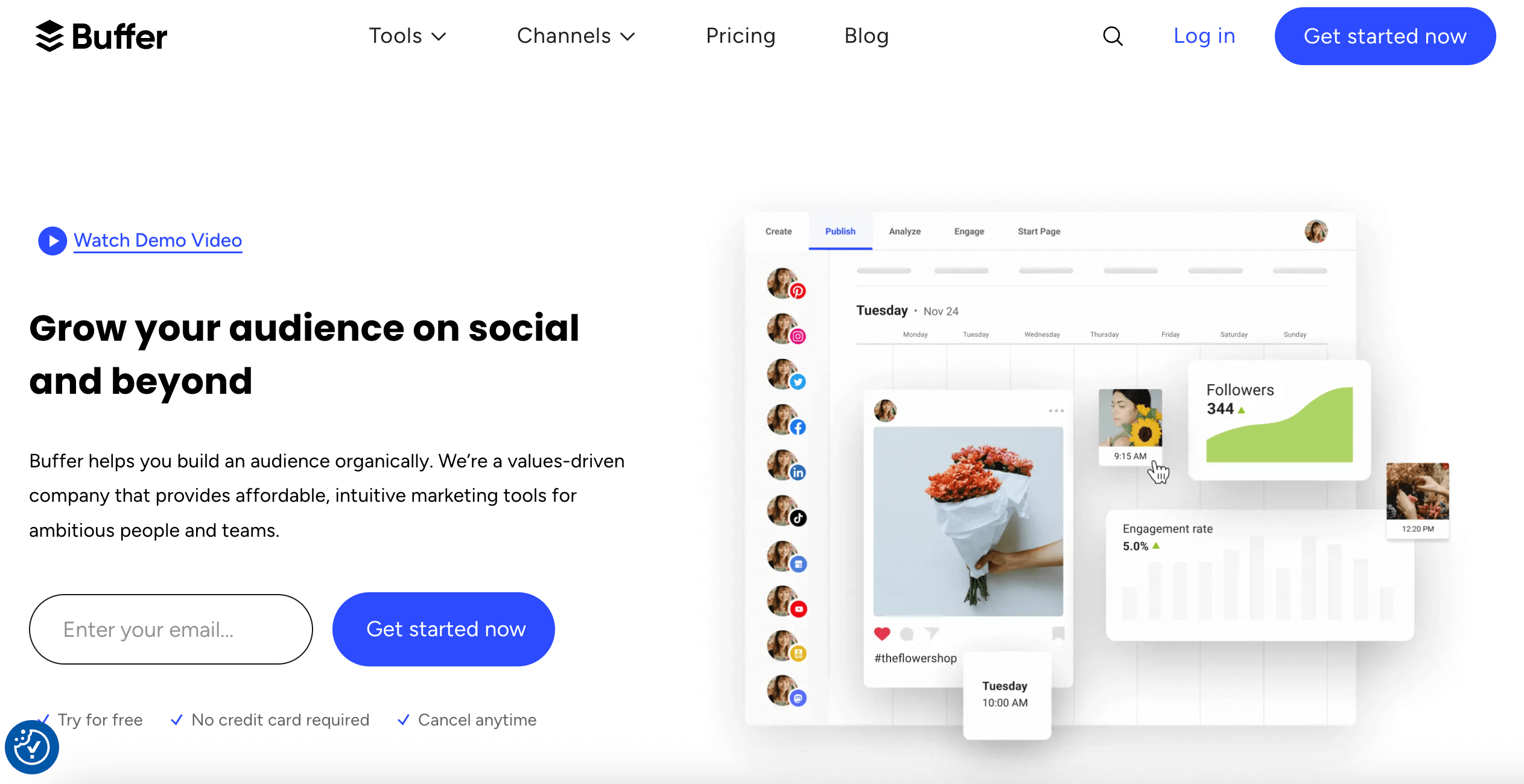
image credit to Buffer
Buffer streamlines social media management for 140,000 customers, offering event organizers content creation, scheduling, and analytics. Users can develop a library of content ideas, create tailored posts for various social media platforms, and leverage suggested hashtags to increase their event’s reach.
Digital marketers praise Buffer’s efficiency, while marketing managers consider it crucial for brand-building. The platform’s automation features for publishing and reporting save valuable time on routine tasks, allowing you to focus on event marketing strategy and engagement.
Buffer is intuitive and affordable, catering to small businesses, individual professionals, and more extensive marketing teams. By balancing automation with user control, the platform empowers you to grow your audience organically across social platforms.
Notable Features: Social media automation, detailed performance reports, AI-assisted content creation, first-comment scheduling, and team collaboration tools.
Why Choose: Event marketers, especially those on small and mid-sized teams, gravitate towards Buffer for its intuitive interface and cost-effective solutions. The platform simplifies social media promotion without requiring extensive technical expertise or large marketing budgets.
Pricing: Starts at $5/month
Event Promotion and Registration Tools
Tools in this category handle event promotions, event pages, and ticketing, simplifying the attendee acquisition process.
7. Eventbrite
Eventbrite is an event promotion and ticketing platform that promotes events through its marketplace.
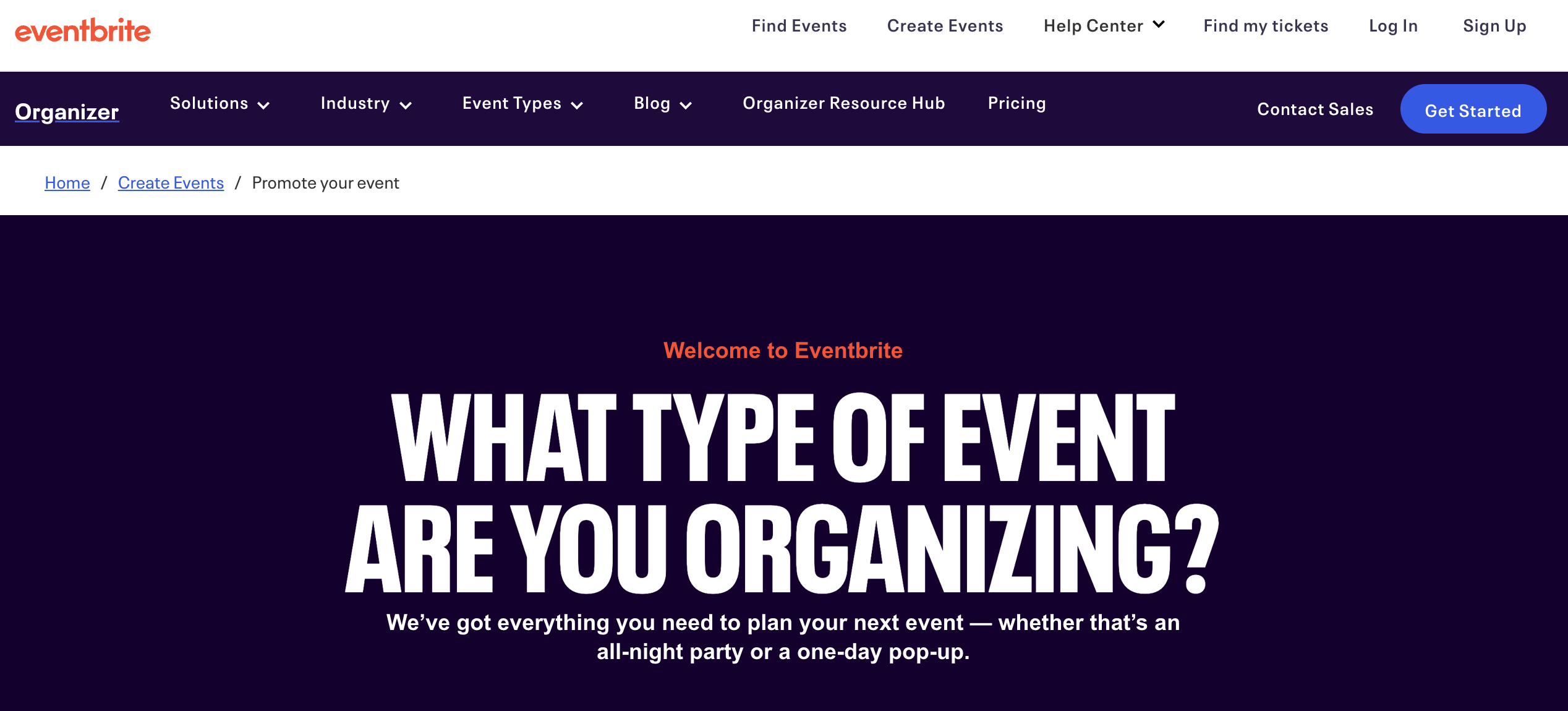
image credit to Eventbrite
Millions of organizers and event attendees rely on Eventbrite’s user-friendly interface and powerful features to create, promote, and attend events of all sizes. Its robust ticketing system features customizable event registration pages and an effortless checkout experience, all hosted on Eventbrite’s popular event marketplace.
The platform’s strength extends beyond ticketing, offering real-time reporting and analytics for valuable insights into buyer behavior and sales trends. Organizers can take their events mobile with the Eventbrite Organizer App, enabling on-the-go check-ins, at-the-door ticket sales, and live data tracking.
For those looking to amplify their reach, Eventbrite Ads offers a hassle-free way to gain up to 14 times more visibility across the platform. Rounding out its offerings, Eventbrite provides a comprehensive suite of marketing tools for event planners, including automated email and social media capabilities, ensuring that organizers can easily engage existing attendees and attract new ones.
Notable Features: Event promotion, registration management, social media integration with Facebook and MailChimp, and SEO optimization for event listings.
Why Choose: Event organizers planning straightforward gatherings appreciate Eventbrite for its user-friendly registration and promotion tools. The platform efficiently handles ticketing and basic marketing, making it ideal for uncomplicated events that don’t require advanced management features.
Pricing: 3.7% + $1.79 service fee per ticket / 2.9% payment processing fee per order
8. Ticketbud
A ticketing platform with strong event promotion capabilities, Ticketbud offers robust email and social media marketing integrations.
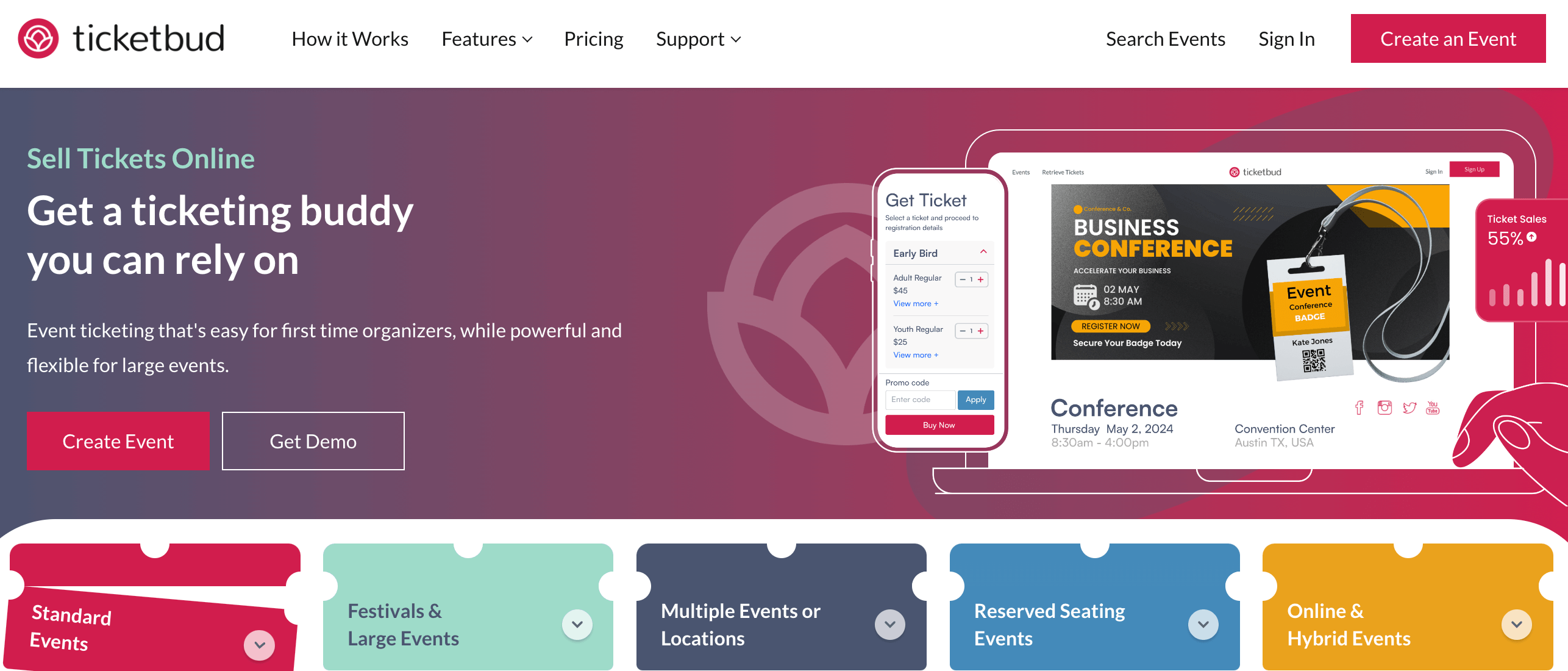
image credit to Ticketbud
Ticketbud simplifies event management with comprehensive features at no upfront cost, making it accessible to all event organizers, regardless of their technical expertise.
You can create an event website in minutes with custom branding, search engine optimization, and mobile responsiveness for maximum visibility.
Its flexible system allows unlimited ticket types, custom registration forms, merchandise sales, and donation collection. And that’s not all. You can sell tickets through event web pages or external websites using ticket and calendar widgets.
Plus, you can drive sales with promotion discount codes, access codes, and referral links. Want to boost revenue? Try its merchandise upselling options. Lastly, TicketBud’s revenue model aligns with your success—their ticketing fee is tied directly to your ticket sales.
Notable Features: Event ticketing, event page customization, email marketing, and basic analytics.
Why Choose: Event organizers with simple, straightforward events like Ticketbud for its easy-to-use registration and promotion tools. Flexible payment options, including no fees for free events, make it particularly attractive for a wide range of organizers, from community groups to small businesses hosting promotional events. On the flip side, you may end up paying a large fee if you sell a lot of tickets.
Pricing: Paid events cost attendees 2% + 99c per ticket / non-profit and school event cost attendees 1.75% + 99c per ticket
Event Analytics and Tracking Tools
Event marketing is incomplete without detailed insights into performance, attendee behavior, and marketing campaign success.
9. Google Analytics (with Event Tracking Setup)
Google Analytics is a free tool that tracks event registrations, landing page performance, and conversion rates.
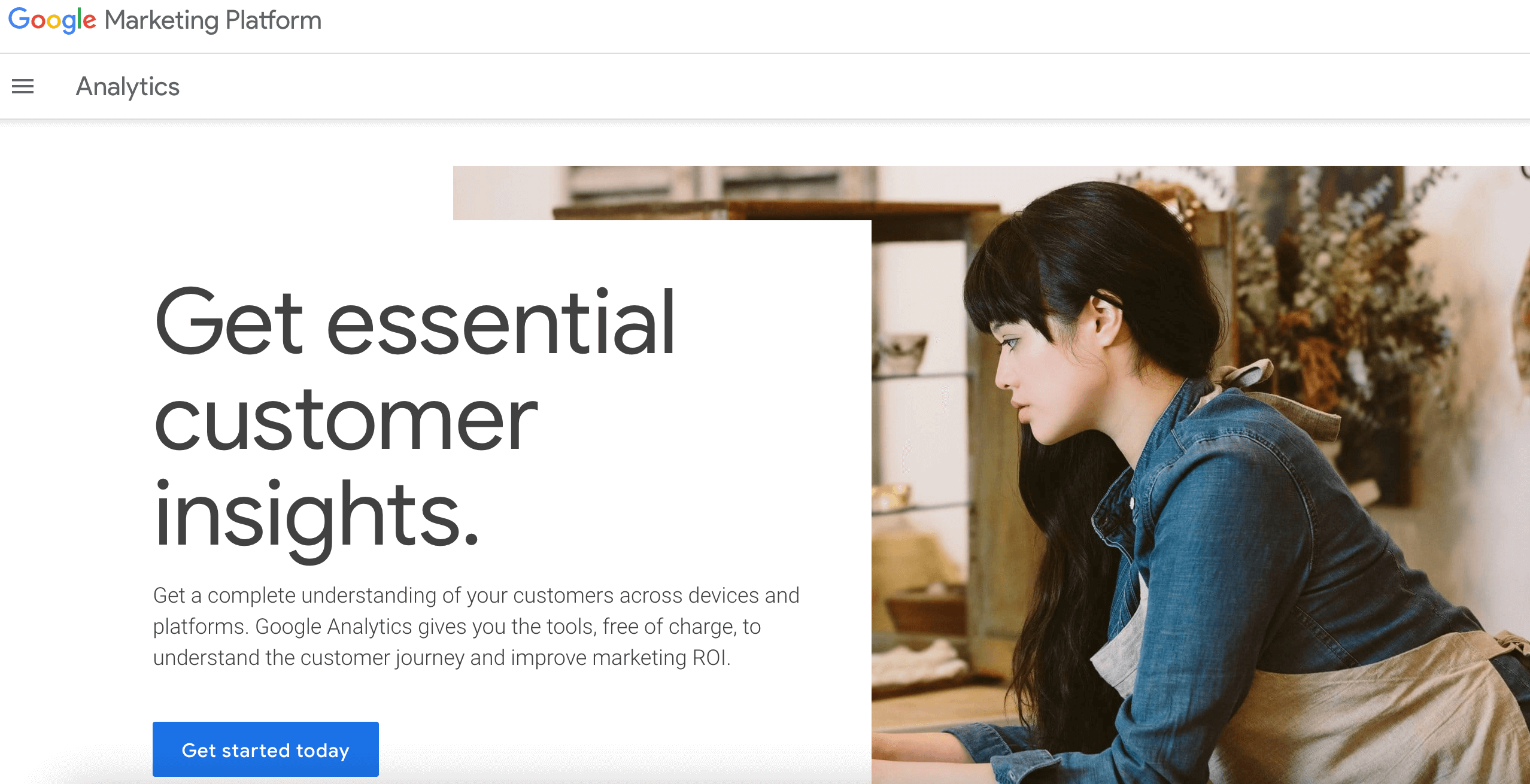
image credit to Google
As the pioneer of web analytics, Google Analytics has set the standard for understanding customer interactions across various digital platforms and devices. The platform now incorporates advanced machine learning capabilities, offering predictive insights that allow event planners to anticipate customer actions and trends.
Google Analytics offers more advanced tracking capabilities, such as cross-device tracking, custom event tracking, and integration with Google Ads for deeper insights into advertising performance. Despite its sophisticated capabilities, it maintains a user-friendly interface, making complex data accessible and manageable for events of all sizes.
One of Google Analytics’ key advantages is its seamless integration with other Google services, such as Google Ads, Google Cloud, and Google Search Console. Its enduring popularity and continuous evolution underscore its status as a cornerstone tool in the digital marketing landscape.
Notable Features: Traffic insights, conversion tracking, user behavior analysis, custom reporting, and data visualization.
Why Choose: Google Analytics is essential for event organizers looking to measure website and marketing campaign success. It allows planners to track specific event metrics, such as ticket page views, registration form completions, and email sign-up rates.
Pricing: $0 – $150,000 for Google Analytics 360
10. Hubilo
Hubilo, one of the best event marketing tools for webinars, offers advanced analytics that track attendee engagement, conversions, and ROI.
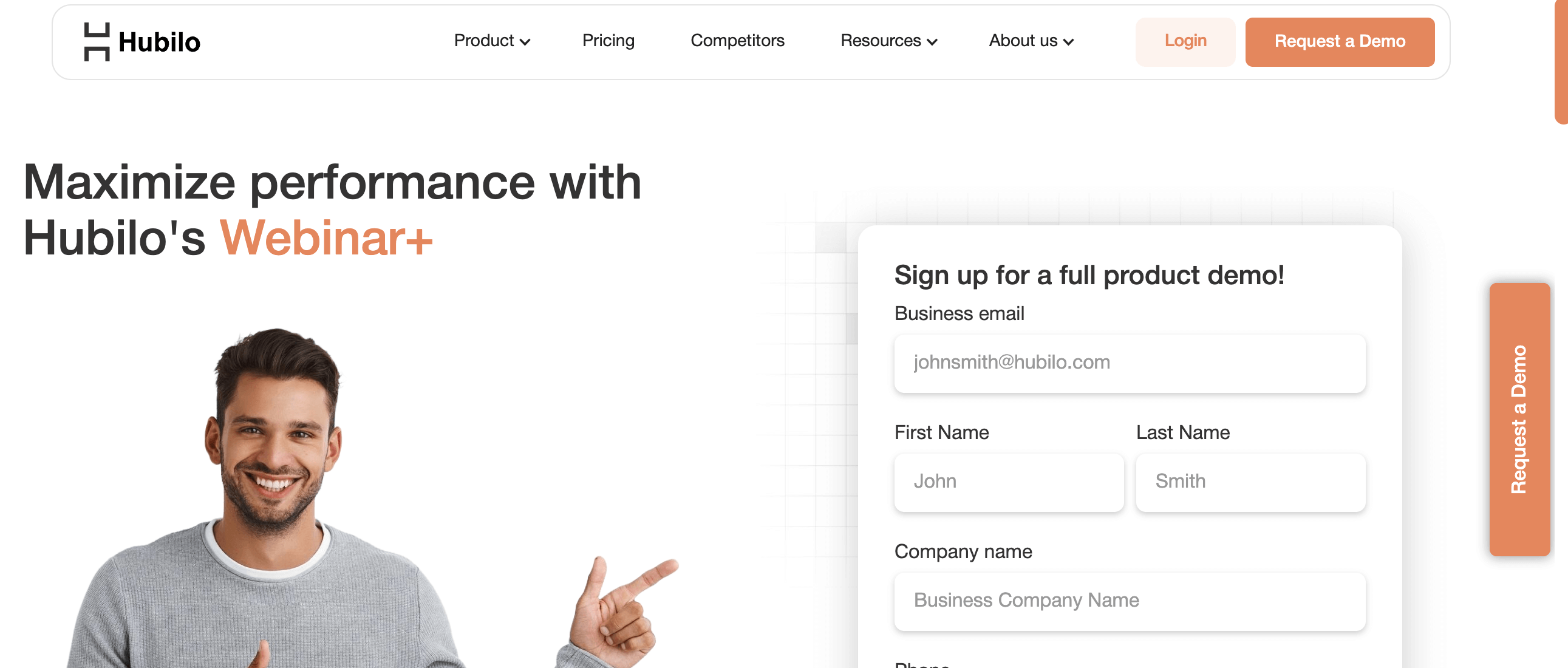
image credit to Hubilo
Hubilo, recognized as the top platform for ROI, usability, and user satisfaction on G2.com, excels in maximizing pipeline, driving engagement, and simplifying content repurposing for webinar events.
Regarding analytics capabilities, it offers detailed metrics such as cumulative watch time for attendees who view live and on-demand sessions. This comprehensive approach enables event organizers to track engagement levels, identify popular content, and make data-driven decisions for future events.
The platform also offers various tools to keep audiences actively involved, including breakout rooms and lounges for more intimate discussions, real-time polls and surveys to gather instant feedback, and chat features to facilitate ongoing conversations.
Notable Features: Engagement analytics, real-time event tracking, lead captures and qualification tools, attendee engagement features (polls, Q&As, chat), and ROI insights.
Why Choose: Marketers love Hubilo for its marketing, content generation, and analytics tools tailored to virtual and hybrid events. These tools enable them to effectively promote, measure, and gain insights from webinar formats.
Pricing: Start at $800/annually
Whova: Best Overall for Balancing Comprehensive Features and Ease of Use
While smaller events may turn to specific platforms for email or social media tools, and large corporations lean towards intricate enterprise systems, Whova is an ideal solution that spans this spectrum, with robust features and scalable capabilities allowing it to serve a diverse range of event organizers.
A comprehensive toolkit, user-friendly design, and demonstrated effectiveness make Whova a strong contender for all event organizers seeking to refine their in-person, virtual, or hybrid event marketing strategies and increase participant involvement.
Opting for an integrated platform like Whova with integrated event marketing tools allows you to redirect energy from tool management to event design, allowing you to host more impactful professional events.

